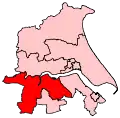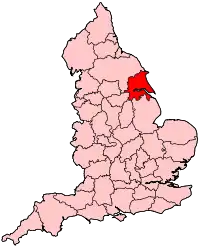Brigg and Goole (UK Parliament constituency)
Brigg and Goole is a constituency in Yorkshire and Lincolnshire[n 1] represented in the House of Commons of the UK Parliament since 2010 by Andrew Percy, a Conservative.[n 2]
| Brigg and Goole | |
|---|---|
| County constituency for the House of Commons | |
 Boundary of Brigg and Goole in the former county of Humberside | |
 Location of the former county of Humberside within England | |
| County | North Lincolnshire, East Riding of Yorkshire |
| Population | 86,706 (2011 census)[1] |
| Electorate | 64,365 (December 2019)[2] |
| Major settlements | Brigg, Goole |
| Current constituency | |
| Created | 1997 |
| Member of Parliament | Andrew Percy (Conservative) |
| Seats | One |
| Created from | Boothferry, Glanford & Scunthorpe and Brigg & Cleethorpes |
The constituency is among a small minority of constituencies that span two ceremonial counties, in this case Lincolnshire and the East Riding of Yorkshire.
The industrial port of Goole is the biggest settlement in the constituency. There are over 70 towns and villages in the constituency, including the Lodge Moor and Skippingdale areas of Scunthorpe. The constituency also includes part of the Scunthorpe Steel Works and the Scunthorpe United football ground, as well as the Isle of Axholme.
The constituency is split across North Lincolnshire and the East Riding of Yorkshire and borders South Yorkshire, North Yorkshire, Nottinghamshire and Lincolnshire.
The seat is due to be abolished for the next general election.[3]
History
Brigg and Goole constituency was created for the 1997 general election from parts of the seats of Boothferry, Glanford & Scunthorpe and Brigg & Cleethorpes.
In the 2007 local elections the Conservatives won 12 of the Council seats in the constituency compared to 6 for Labour, 2 for the Liberal Democrats and 1 Independent.[n 3]
In 2010 Andrew Percy won the Brigg and Goole constituency for the first time at the 2010 general election, ending 13 years of representation by the Labour Party. The Liberal Democrats amassed their largest share of the vote since the seat's creation in 1997.
In the 2011 local elections the Conservatives made further progress, winning 3 seats from Labour and one from the Independents. The Conservatives now have 15 councillors, compared to 5 for Labour (2 gains from the Liberal Dems) and one Independent. The Conservatives also increased their share of vote compared to 2007.
In the 2015 general election, the Conservatives received their highest vote ever in the constituency, with Labour receiving their lowest number of votes. Following the council elections held on the same day, the Conservatives now have 16 Councillors in this constituency, 14 on North Lincs Council and 2 on the East Riding of Yorkshire Council. Labour have a record low 4 Councillors and there is 1 Independent.
At the 2017 general election, the Conservatives again recorded a swing towards them from Labour, against both the regional and national swings.
In the 2019 local Council elections Labour lost all of their Council seats in the constituency with the Conservatives gaining 3 Council seats. Currently there are 19 Conservative Councillors in the constituency (15 sitting on North Lincs Council and 4 sitting on the East Riding of Yorkshire Council) and 2 Independent Councillors. Incumbent MP Andrew Percy got re-elected with 71.3% of the vote, making it one of the safer Conservative seats in all of Britain in spite of having been held by Labour merely ten years before.
Boundaries
The Borough of North Lincolnshire wards of Axholme Central, Axholme North, Axholme South, Brigg and Wolds, Broughton and Appleby, Burringham and Gunness, and Burton upon Stather and Winterton, and the District of East Riding of Yorkshire wards of Goole North, Goole South, and Snaith, Airmyn, Rawcliffe and Marshland.
Proposed abolition
Further to the completion of the 2023 Periodic Review of Westminster constituencies, the seat will be abolished for the next general election, with its contents distributed four ways:[3]
- Brigg and South Ferriby included in the new constituency of Brigg and Immingham
- Burringham and Winterton transferred to Scunthorpe
- The Isle of Axholme included in a new cross-county boundary seat named Doncaster East and the Isle of Axholme
- The parts in the East Riding of Yorkshire, including the town of Goole, included in the new constituency of Goole and Pocklington
Members of Parliament
| Elections | Member[4][5] | Party | |
|---|---|---|---|
| 1997 | Ian Cawsey | Labour | |
| 2010 | Andrew Percy | Conservative | |
Elections
Elections in the 2010s
| Party | Candidate | Votes | % | ±% | |
|---|---|---|---|---|---|
| Conservative | Andrew Percy | 30,941 | 71.3 | ||
| Labour | Majid Khan | 9,000 | 20.7 | ||
| Liberal Democrats | David Dobbie | 2,180 | 5.0 | ||
| Green | Jo Baker | 1,281 | 3.0 | ||
| Majority | 21,941 | 50.6 | |||
| Turnout | 43,402 | 65.8 | |||
| Conservative hold | Swing | ||||
| Party | Candidate | Votes | % | ±% | |
|---|---|---|---|---|---|
| Conservative | Andrew Percy | 27,219 | 60.4 | ||
| Labour | Terence Smith | 14,856 | 33.0 | ||
| UKIP | David Jeffreys | 1,596 | 3.5 | ||
| Liberal Democrats | Jerry Lonsdale | 836 | 1.9 | ||
| Green | Isabel Pires | 550 | 1.2 | ||
| Majority | 12,363 | 27.4 | |||
| Turnout | 45,057 | 68.2 | |||
| Conservative hold | Swing | ||||
| Party | Candidate | Votes | % | ±% | |
|---|---|---|---|---|---|
| Conservative | Andrew Percy | 22,946 | 53.0 | ||
| Labour | Jacky Crawford | 11,770 | 27.2 | ||
| UKIP | David Jeffreys | 6,694 | 15.5 | ||
| Green | Natalie Hurst | 915 | 2.1 | New | |
| Liberal Democrats | Liz Leffman | 764 | 1.8 | ||
| Independent | Trevor Dixon | 153 | 0.4 | New | |
| An Independence from Europe | Ray Spalding | 28 | 0.1 | New | |
| Majority | 11,176 | 25.8 | |||
| Turnout | 43,270 | 63.2 | |||
| Conservative hold | Swing | ||||
| Party | Candidate | Votes | % | ±% | |
|---|---|---|---|---|---|
| Conservative | Andrew Percy | 19,680 | 44.9 | ||
| Labour | Ian Cawsey | 14,533 | 33.1 | ||
| Liberal Democrats | Richard Nixon | 6,414 | 14.6 | ||
| UKIP | Nigel Wright | 1,749 | 4.0 | ||
| BNP | Steve Ward | 1,498 | 3.4 | New | |
| Majority | 5,147 | 11.8 | N/A | ||
| Turnout | 43,875 | 65.1 | |||
| Conservative gain from Labour | Swing | ||||
Elections in the 2000s
| Party | Candidate | Votes | % | ±% | |
|---|---|---|---|---|---|
| Labour | Ian Cawsey | 19,257 | 45.2 | ||
| Conservative | Matthew Bean | 16,363 | 38.4 | ||
| Liberal Democrats | Gary Johnson | 5,690 | 13.4 | ||
| UKIP | Stephen Martin | 1,268 | 3.0 | ||
| Majority | 2,894 | 6.8 | |||
| Turnout | 42,578 | 63.2 | |||
| Labour hold | Swing | ||||
| Party | Candidate | Votes | % | ±% | |
|---|---|---|---|---|---|
| Labour | Ian Cawsey | 20,066 | 48.9 | ||
| Conservative | Donald M. Stewart | 16,105 | 39.2 | ||
| Liberal Democrats | David P. Nolan | 3,796 | 9.2 | ||
| UKIP | Godfrey Bloom | 688 | 1.7 | New | |
| Socialist Labour | Michael A. Kenny | 399 | 1.0 | New | |
| Majority | 3,961 | 9.7 | |||
| Turnout | 41,054 | 63.5 | |||
| Labour hold | Swing | ||||
Elections in the 1990s
| Party | Candidate | Votes | % | ±% | |
|---|---|---|---|---|---|
| Labour | Ian Cawsey | 23,493 | 50.2 | ||
| Conservative | Donald M. Stewart | 17,104 | 36.5 | ||
| Liberal Democrats | Mary-Rose Hardy | 4,692 | 10.0 | ||
| Referendum | Derek M. Rigby | 1,513 | 3.2 | ||
| Majority | 6,389 | 13.7 | |||
| Turnout | 46,802 | 73.0 | |||
| Labour win (new seat) | |||||
Notes
- A county constituency (for the purposes of election expenses and type of returning officer)
- As with all constituencies, the constituency elects one Member of Parliament (MP) by the first past the post system of election at least every five years.
- Conservatives gained Wards including: Burringham and Gunness and the Snaith, Airmyn, Rawcliffe and The Marshlands in the 2007 elections.
References
- "Brigg and Goole: Usual Resident Population, 2011". Neighbourhood Statistics. Office for National Statistics. Retrieved 2 February 2015.
- "Constituency data: electorates – House of Commons Library". Parliament UK. 15 June 2020. Retrieved 22 July 2020.
- "The 2023 Review of Parliamentary Constituency Boundaries in England – Volume one: Report – Yorkshire and the Humber | Boundary Commission for England". boundarycommissionforengland.independent.gov.uk. Retrieved 22 July 2023.
- "Brigg and Goole 1997-". Parliamentary Debates (Hansard). Retrieved 2 February 2015.
- Leigh Rayment's Historical List of MPs – Constituencies beginning with "B" (part 5)
- "Archived copy" (PDF). Archived from the original (PDF) on 15 November 2019. Retrieved 15 November 2019.
{{cite web}}: CS1 maint: archived copy as title (link) - "General Election 2017 full list of Hull and East Yorkshire candidates". Hull Daily Mail. 11 May 2017. Archived from the original on 15 May 2017. Retrieved 14 May 2017.
- "Election Data 2015". Electoral Calculus. Archived from the original on 17 October 2015. Retrieved 17 October 2015.
- "Brigg & Goole". BBC News. Retrieved 11 May 2015.
- "Election Data 2010". Electoral Calculus. Archived from the original on 26 July 2013. Retrieved 17 October 2015.
- "UK > England > Yorkshire & the Humber > Brigg & Goole". Election 2010. BBC. 7 May 2010. Retrieved 11 May 2010.
- "Election Data 2005". Electoral Calculus. Archived from the original on 15 October 2011. Retrieved 18 October 2015.
- "Election Data 2001". Electoral Calculus. Archived from the original on 15 October 2011. Retrieved 18 October 2015.
- "Election Data 1997". Electoral Calculus. Archived from the original on 15 October 2011. Retrieved 18 October 2015.
External links
- nomis Constituency Profile for Brigg and Goole — presenting data from the ONS annual population survey and other official statistics.